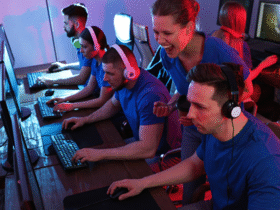In recent years, computer games have transcended entertainment to become a powerful tool for enhancing communication skills. As remote work becomes increasingly prevalent, virtual meetings have become essential for professional collaboration. Interestingly, the skills and concepts learned in gaming can significantly influence how we engage in these online discussions. Here are five ways computer games enhance communication in virtual environments.
5 Ways Computer Games Influence Effective Communication
1. Encouraging Teamwork and Collaboration
Many computer games are built around the concept of teamwork, requiring players to collaborate to achieve common goals. Titles like “Overwatch” and “Fortnite” necessitate strategic planning and coordinated efforts among team members. This emphasis on collaboration can translate to the workplace, where effective communication is vital for project success.
In video meetings, participants who have experience working in teams in gaming environments are often more adept at collaborating. They can quickly assess team dynamics, understand roles, and communicate effectively to ensure everyone is on the same page. This familiarity with teamwork can enhance productivity and foster a more cohesive group atmosphere during virtual discussions.
2. Improving Problem-Solving Skills
Video games frequently present players with complex challenges and puzzles that require creative thinking and problem-solving. Games like “Portal” and “The Legend of Zelda” encourage players to think critically and devise strategies to overcome obstacles. This experience cultivates strong analytical skills that can be applied in professional settings.
During virtual discussions, employees with gaming backgrounds may approach problems more creatively, proposing innovative solutions that others might overlook. Their ability to think outside the box can lead to more dynamic conversations, encouraging a culture of problem-solving and collaboration.
3. Enhancing Communication Skills
Effective communication is a core component of most multiplayer computer games. Players must relay information, strategize, and provide feedback to one another in real-time. This constant interaction helps develop clear and concise communication skills.
When participating in online discussions, individuals with gaming experience often bring these skills to the table. They are more likely to express their thoughts clearly and engage others in conversations, leading to more productive and dynamic interactions. Their ability to convey information efficiently helps streamline dialogues, making it easier to address key points and reach consensus.
4. Building Confidence in Virtual Environments
For many, participating in online discussions can be intimidating, especially when presenting ideas to colleagues or clients. However, the confidence gained from playing computer games can significantly impact how individuals approach these situations. In gaming, players regularly face challenges and learn to handle both success and failure.
This experience can help build resilience and self-assurance, enabling individuals to participate more actively in virtual discussions. Confident participants are more likely to contribute their ideas and engage in conversations, creating a more interactive and collaborative environment.
5. Fostering a Sense of Community
Computer games have a unique ability to create communities. Whether through online multiplayer experiences or gaming forums, players often build relationships and networks that extend beyond the game itself. This sense of community can be beneficial in the workplace, particularly in remote settings where personal interactions are limited.
In virtual meetings, individuals who have cultivated a sense of community through gaming are more likely to engage with their colleagues and foster positive relationships. This camaraderie encourages open communication and collaboration, making team members feel more comfortable sharing their thoughts and ideas during discussions.
Conclusion
The influence of computer games on communication extends far beyond the realm of entertainment. By fostering teamwork, enhancing problem-solving skills, improving communication, building confidence, and creating a sense of community, gaming can significantly impact how individuals engage in professional discussions. As remote work continues to evolve, harnessing the skills developed through gaming can lead to more effective communication and collaboration in the workplace. Embracing this connection can ultimately enhance team dynamics and drive success in a digital world.















Leave a Reply